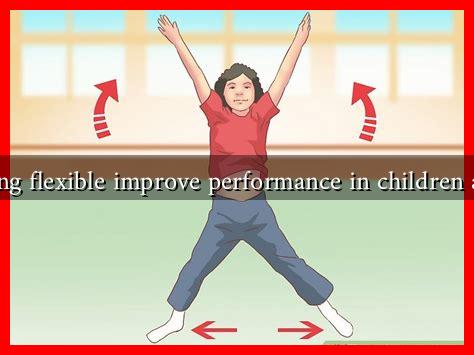-
Table of Contents
Does Being Flexible Improve Performance in Children and Teens?
Flexibility is often associated with physical attributes, such as the ability to perform a split or touch one’s toes. However, the concept of flexibility extends beyond the physical realm; it encompasses mental and emotional adaptability as well. In recent years, research has increasingly focused on how flexibility—both physical and psychological—can enhance performance in children and teens across various domains, including sports, academics, and social interactions. This article explores the multifaceted benefits of flexibility and its impact on performance in young individuals.
The Importance of Physical Flexibility
Physical flexibility refers to the range of motion in joints and muscles. It is a crucial component of overall fitness and plays a significant role in athletic performance. Here are some key benefits of physical flexibility for children and teens:
- Injury Prevention: Flexible muscles and joints are less prone to injuries. A study published in the *Journal of Sports Medicine* found that athletes with greater flexibility had a lower incidence of injuries.
- Improved Performance: Flexibility can enhance performance in sports by allowing for better movement efficiency. For instance, gymnasts and dancers rely heavily on flexibility to execute their routines effectively.
- Enhanced Recovery: Flexible individuals often experience quicker recovery times after physical exertion, which is essential for young athletes who train frequently.
Incorporating flexibility training into physical education programs can significantly benefit students. Activities such as yoga, stretching, and dynamic warm-ups can help improve flexibility and overall athletic performance.
The Role of Mental Flexibility
Mental flexibility, or cognitive flexibility, refers to the ability to adapt one’s thinking and behavior in response to changing circumstances. This skill is crucial for problem-solving, creativity, and social interactions. Here are some ways mental flexibility can improve performance in children and teens:
- Enhanced Problem-Solving Skills: Children who exhibit mental flexibility can approach problems from multiple angles, leading to more effective solutions. A study from the *American Psychological Association* found that children with higher cognitive flexibility performed better in math and science.
- Improved Social Interactions: Flexible thinkers are better equipped to navigate social situations, as they can adjust their behavior based on the reactions of others. This adaptability can lead to stronger friendships and better teamwork.
- Increased Resilience: Mental flexibility fosters resilience, allowing children and teens to cope with setbacks and challenges more effectively. This resilience is crucial for academic success and emotional well-being.
Case Studies and Real-World Examples
Several case studies illustrate the positive impact of flexibility on performance in children and teens:
- The Yoga in Schools Initiative: A program implemented in various schools across the United States has shown that incorporating yoga into the curriculum improves students’ focus, reduces anxiety, and enhances overall academic performance.
- Sports Teams and Flexibility Training: Many youth sports teams have adopted flexibility training as part of their practice routines. For example, a youth soccer team that integrated stretching and yoga reported fewer injuries and improved game performance.
Statistics Supporting Flexibility Training
Research supports the notion that flexibility training can lead to improved performance:
- A study published in the *International Journal of Sports Physical Therapy* found that athletes who engaged in regular flexibility training improved their performance metrics by an average of 10%.
- According to the *National Center for Health Statistics*, children who participate in flexibility-enhancing activities are 30% less likely to experience sports-related injuries.
Conclusion
In conclusion, both physical and mental flexibility play vital roles in enhancing performance in children and teens. By fostering physical flexibility through activities like stretching and yoga, young individuals can reduce their risk of injury and improve their athletic capabilities. Simultaneously, promoting mental flexibility can enhance problem-solving skills, social interactions, and resilience. As educators, parents, and coaches, it is essential to recognize the importance of flexibility training and incorporate it into daily routines. By doing so, we can help children and teens reach their full potential in various aspects of their lives.
For more information on the benefits of flexibility training, you can visit American Psychological Association.

